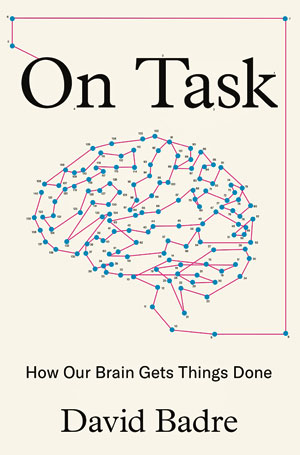
On any given day, we accomplish a wide range of tasks from big long-term goals down to the simplest chores like making a cup of coffee. If we have a new goal in mind, we can even perform tasks that we have never done before. (I’m doing that right now). This all seems routine to us, but no other species on the planet and no Artificial Intelligence yet built comes even close to this ability. On Task is about how we do this; in other words, the book explains the science behind how our brains get things done.
At the heart of this ability to get things done is a function that neuroscientists term cognitive control or executive function. Cognitive control is what allows us to bridge our knowledge with action and to perform any task that meets our goals. Neuroscience and psychology have taught us that it is not enough to want to do a task or even to be able to state the rules for doing so; our brain needs a way of taking that knowledge and building a plan to execute it. And it needs to adjust what we are doing along the way to keep us on track. Ultimately, it needs a way of mapping what we want to do to how we actually do it. That is the function that cognitive control serves, and humans do it better than any other species.
This is why we can do just about any task that we can conceive. But this gift of nimble cognition also comes with some costs and limitations, which likewise impact our lives. For example, the difficulties we have in multitasking, the exhaustion we experience when we exert mental effort, the everyday slips and errors we commit in our actions, and the years we spend as children growing and developing toward independence are all consequences of this unique system for controlling our behavior.
My book is for readers who are generally curious about the brain and cognition, as well as those with interests in specific topics, such as decision making, memory, productivity, child development, aging, the benefits of “brain training”, and the challenges of mental health. The book addresses all of these topics through the lens of cognitive control. On Task invites readers to explore this unfamiliar aspect of cognitive function and to ask how the brain translates what we know and conceive into how we act.
Cognitive control and its mechanisms in the brain affect just about everything we do. They affect our ability to be productive, to multitask, to resist our impulses, to navigate our digital world, and even to remember. Cognitive control shapes both how we grow up into independent adults and how we maintain that independence as we age. And, cognitive control function is commonly affected in a wide array of psychiatric and neurological health problems. This book provides a framework for understanding cognitive control across its diverse facets in terms of the science behind it.
I have long been curious about the mind and brain. I want to understand how it is that humans can be so ingenious and adaptable across such a wide range of circumstances. What other species could enact a sudden, coordinated change in its behavior almost worldwide in response to a pandemic, like we’ve witnessed in response to COVID-19 in the past several months?
Consider that many of us learned how to do our work remotely, routinely using new applications like Zoom or Slack that we hadn’t used before. We found new ways to find food, to meet with friends, and to organize our lives. We added new everyday routines few of us would have imagined adding before, like remembering to bring a mask whenever you leave the house. The very course of our daily lives changed radically, and yet we made these changes in a matter of days and weeks. It didn’t require thousands of trial-and-error learning events or thousands of years of evolution to develop these behaviors. We did them nearly overnight because of our capacity for cognitive control.
Of course, while our ability to make these changes is astonishing, it also important to ask why all this is so hard. Why does it feel so exhausting this year? Why is it so hard for parents when their children are home while they try to work? And, more ominously, why do we see widespread “pandemic fatigue”, meaning that people worldwide are complying less and less with behaviors that can help mitigate the virus spread?
The book does not address COVID directly, but the topics we cover provide insight into questions like these. I’ve devoted my scientific career to investigating these questions with a focus on the neuroscience of cognitive control. On Task is a chance to offer a first introduction to this topic to a non-specialist audience.
Curious readers who start with the first chapter are introduced to a puzzle that seems trivial yet is such a mystery that science still doesn’t have a full answer to it. Namely, why is it that we can have a goal in mind, can know what needs to be done, can urgently want that it be done, and yet, fail to do it? In other words, what connects our knowledge and goals with our actions? The brain requires a way of linking even our simplest fantasies about what we want to do with the reality of doing it. This is the basic function served by cognitive control, and its implications might surprise you.
Consider, for example, the case of patient EVR, who was reported in the literature by Paul Eslinger and Antonio Damasio. A brain tumor had necessitated the removal of a large portion of EVR’s frontal lobe, a part of the brain that is essential for cognitive control function. After his surgery, EVR’s clinical assessment came out quite positive. He aced the cognitive tests he was given, and based only on these, it appeared his cognitive function had not been impacted by his brain damage at all.
But EVR’s life outside the clinic had taken a very different turn. Prior to EVR’s disease and surgery, he had been a successful accountant, who was well respected and active in his community. Within a few short years, however, he lost his job, his marriage, a second marriage, and his overall enterprise in life. He was unable to get much of anything done. He could articulate the goals for his actions, the things he wanted to do, but was unable to carry them out in an organized or meaningful way.
In EVR’s case, we see the paradox of cognitive control. It’s not enough that we can know what we want to do or even that we can carry out simple tasks, like those tested in the clinic. We need a way to link our knowledge to our action. In our complex and busy worlds, our brain needs a system to organize our behavior in time and with open-ended goals. And it needs a way to stay on track. The chapter draws on this and other striking observations of patients who have lost cognitive control function along with other examples that have long made scientists curious. I hope it will intrigue readers, as well.
Other readers might just jump to chapters on the topics that interest them from the outset. For example, the chapter on multitasking might be of interest to anyone living in our hectic digital world. That chapter explains why we are so bad at multitasking (and why we sometimes aren’t). Armed with this knowledge, it considers what this might mean for our everyday lives.
Cognitive control is central to our lives, but there is little broad understanding of the science behind it. I hope that readers will be introduced to something they didn’t know before and will gain a better understanding of this core but unfamiliar cognitive function. Though On Task is not strictly a self-help book, readers may also be able to use this knowledge to help cognitive control in their own lives. Cognitive control is within our control, so to speak, and we can structure our lives and environment to help our cognitive control system.
Further, there is a lot of misinformation out there about concepts like executive function and brain structures like the prefrontal cortex. I commonly see claims being made about executive function that are not well grounded in scientific evidence, particularly among groups known to need aid with their executive function, like children or older adults. This has resulted in confusions and some widely held misconceptions.
Moreover, there are also a number of widely marketed cognitive training interventions that claim to improve cognitive control or executive function. I treat that topic directly in the book and suggest to readers ways that they can evaluate such claims for themselves.
Having a firmer grasp of the science may help readers navigate these topics better when they encounter them in their everyday lives. More generally, this book presents a story about how scientists approach a perplexing scientific problem. I hope reading that captivating tale will contribute to promoting curiosity and an appreciation of science in the broader public.


David Badre is Professor of Cognitive, Linguistic, and Psychological Sciences at Brown University, where he is also on the faculty of the Carney Institute for Brain Science. He received his PhD at MIT and did his postdoctoral fellowship at UC Berkeley. His lab studies the neuroscience of cognitive control and executive function. His research has been recognized by several awards, including an Alfred P. Sloan Foundation Fellowship in Neuroscience, a James S. McDonnell Scholar Award in Understanding Human Cognition, and the Cognitive Neuroscience Society Young Investigator Award. He lives in Providence, Rhode Island with his family.